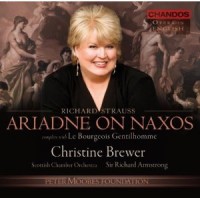
Chandos’ Opera In English series continues with a new two-disc set
of Strauss’ much-admired Ariadne on Naxos, with the Hofmannsthal libretto translated by Christopher Cowell. Sir Richard Armstrong conducts the Scottish Chamber Orchestra and a starry if uneven cast led by Christine Brewer in the title role.
This reviewer has never fully warmed to the charms of Ariadne, except for the thrilling music of the Composer in the prologue and the character’s passionate defense of the musical art form. I had high hopes that this recording in English would provide new musical revelations and exciting new discoveries. Alas, those hopes were not fulfilled.
First of all, the recording seems poorly engineered. This listener (and I have quite a good stereo system) had to constantly and maddeningly adjust the volume because forte moments are too loud, but quiet moments are too soft. The soloists sounded either too close or too far from the microphones, and Armstrong’s orchestra frequently overwhelmed the singers.
Cowell’s English translation runs the gamut from poetic to precious. Poetic (in the aria of the Composer):
“Music is a holy flame tended only by the brave and the true, like cherubim guarding a radiant throne. That is why one art is holier than all the others, and music is that holy art.”
Yet these words of Bacchus sound like a children’s nursery rhyme:
“Circe, I have escaped you,
See, I am happy and free!
Circe, Circe what grim adventure
Was planned for me?”
Some of the English libretto is quite sublime, but it often turns brittle and cloying.
Mezzo-soprano Alice Coote is a radiant and exciting Composer. Bursting with artistic fervor, Coote delivers a silvery sound, full toned from top to bottom. She brings a full palette of vocal colors, moving nimbly from the Composer’s panicked early moments to his depth of feeling at the end of the Prologue. The Prologue is also graced by the fine actor Stephen Fry as the Major Domo, with just the right amount of wit and archness; Alan Opie as the harried Music Master, and John Graham-Hall, with loads of personality as the Dancing Master.
Brewer, a singer I admire, disappoints here. Though she is done no favors by the dynamics of this recording, it appears that a few acid streaks are appearing in the upper register of her lush soprano. While the middle and lower areas of the voice remain powerful and expressive, she seems to lurch wildly in her attacks on high notes, with frequently unpleasant results. She also has the weakest diction of the principals—we could use some more final consonants, particularly.
Gillian Keith has all the requisite, easily-produced coloratura for Zerbinetta, but brings very little color, heart, or individual personality to the role. Robert Dean Smith acquits himself admirably as Bacchus, using his fine, stentorian tenor and clear diction to bring the God to vivid life.
Armstrong’s conducting drives the piece forward admirably, but occasionally seems limp in the quieter passages and overpowering in climaxes. His best work, and that of the Scottish Chamber Orchestra, is in Strauss’ incidental music for Hofmannsthal’s adaptation of Le Bourgeois Gentilhomme, generously included with this set. It goes nicely with the opera, as this play was performed with the Naxos act of Ariadne in its 1912 premiere. It was not until 1916 that the play was dropped from the bill in favor of the Prologue written in 1915.
This recording in English certainly has its charms and its powerful moments, and will be a welcome addition to Ariadne aficionados. But, taken as a whole, it disappoints.
























Comments